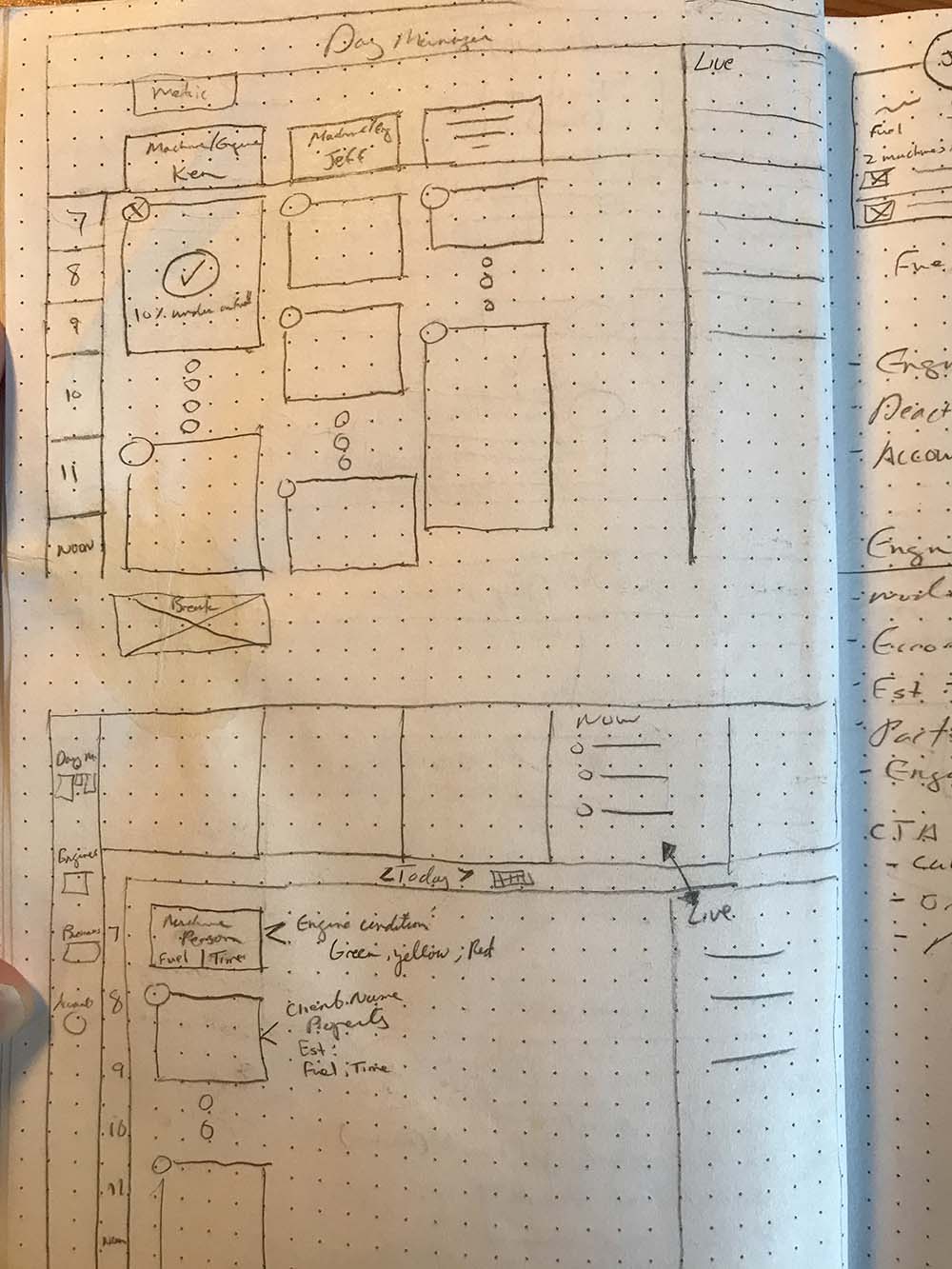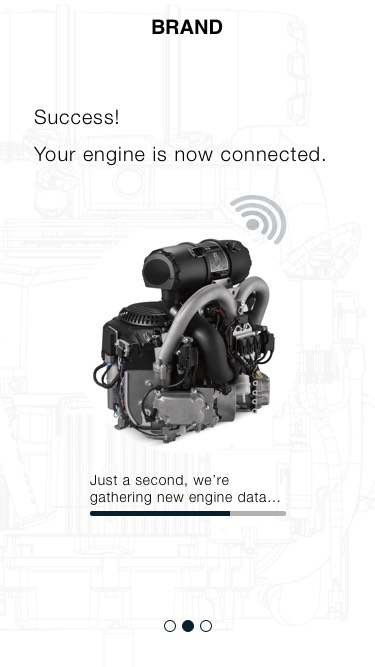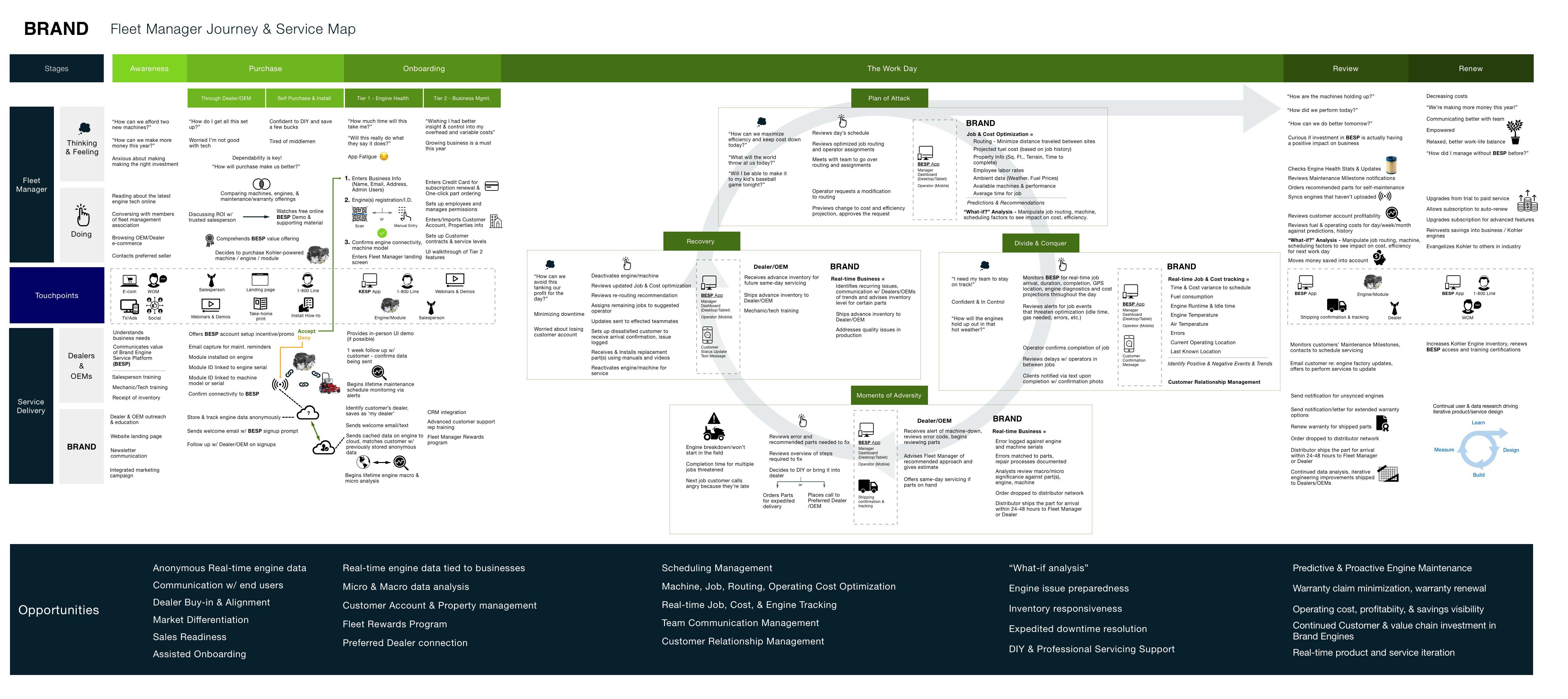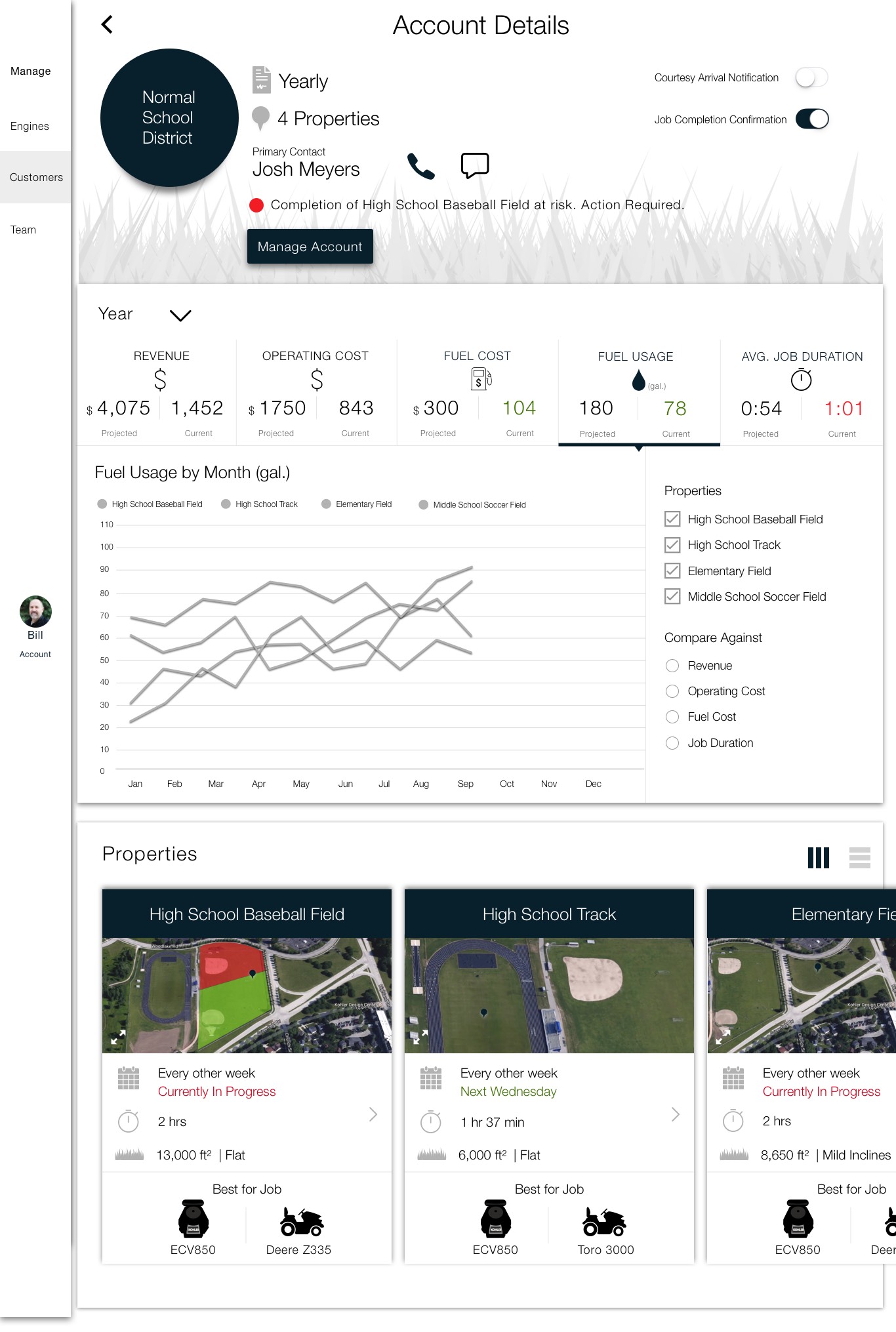ROLE
Lead Designer, Researcher
The grass was still brown, but spring was in the air as we arrived at the headquarters of a large engine manufacturer. Their engines are used for a variety of commercial purposes, including the powering of lawn mowers used by professional landcaping and property management businesses. They had started to develop a device that could be installed on their engines and and send diagnostic data to the cloud.
A design-driven company themselves, they did not want to rush to market a product based merely on technology itself. We were approached to explore, and envision how they could deliver real value to an ecosystem of users and partners through an entirely new product or service.
Over the course of an intense one month sprint, I conducted research, product storyboarding, journey mapping, ideation, and interaction design to deliver a vision for the new service.
The Landscape
Our client, which I will refer to as "The Brand" going forward, was helpful in giving us an initial orientation on their customer and partner ecosystem. They sought to deliver new value to all.
- Commercial/Fleet Owners - Individuals who provide professional landscaping or mowing services, and typically own a fleet of heavy-duty machines.
- Residential Owners - People who own and use a heavy-duty riding or push mower to take care of their own properties.
- The Brand (Our Client) - The new service represented an opportunity to have a more direct relationship with end-users, as OEMs and Dealers stood between them.
- Original Equipment Manufacturers (OEMs) - Companies such as John Deere, or Toro, purchase engines from The Brand and install them in their own lawn mowers.
- Dealers - Residential and Commercial Owners buy their equipment from local or online dealers, and get them serviced at a dealer location.
Digging for Insights
We determined that the biggest areas for both value delivery and business opportunity was how the service could support the Commercial Owners - or "Fleet Managers", so we focused our efforts there.
I conducted secondary research for any qualitative data I could quickly obtain. For each player, I grouped the data into the following categories that helped me understand their:
- Value Offering
- Brand Identity
- People Problems
- Day-to-day Pain Points
- Blindspots
Product Storyboarding
I wanted to anchor my entire design process to a narrative arc, so the story of the product was relatable and could be easily understood. I started the narrative by first adressing the four questions most good products should be able to answer: What is it, When do I use it, Why should I care, and How does it work?
Once I had these questions answered, I sketched a rough storyboard that adhered to a traditional dramatic arc, and showed eight framed moments using a problem-solution-benefit structure.

The storyboard showed how the service would come to the rescue when an engine problem occurred and ultimately enable the owner to keep their clients happy, and prevent the employee from missing his son's baseball game.
The Vision
I pushed to to define the "why" behind the service. Beyond the features or the technology, why does it exist? The team worked together to define a Vision Statement that we felt was aligned with the The Brand's identity, and struck the right balance between setting a high-level purpose and being actionable.

OUR VISION
A calling to power the machines, and empower the people who use them to run their worlds.
OUR VISION
A calling to power the machines, and empower the people who use them to run their worlds.
Define: Running their Worlds
Define: Running their Worlds
FROM
Fitting in life amongst work
Making ends meet
Guessing
TO
Making work and life, work togther
Getting paid back
Confidently Knowing
Envisioning the Journey
Now it was time to map out how our vision and story could be delivered to the Fleet Managers through a new service, within the context of their normal day.
Starting with sketches and later pixels, I mapped out how The Brand, Dealers, and OEMs could collaborate to deliver a multi-touchpoint experience for Fleet Managers throughout their normal work day. I identified phases throughout that would be cylical and could occur multiple times within any given day.
High-res version here.
Conceptual Designs
Our experience and service map laid a lot out there. I followed by starting to design the Brand Engine Service Platform App to zoom in and demonstrate how specific features could capitalize on some of the opportunities we had identified.
We picked the following opportunities to further explore through the conceptual designs:
- Predictive & Proactive Engine Maintenance
- Operating Cost Optimization - "What-if analysis"
- Real-time Job, Cost, and Engine tracking
- Scheduling Management
- Customer Relationship Management


Since our timeline was short, I quickly jumped into visual design. I decided to design for a tablet, since a Fleet Manager would require mobility, but also desire information density, both of which could be afforded by a tablet.
Fleet Manager Designs
Fleet Manager Designs
'Day Manager' serves as the main hub of the app. Based on today's jobs, the machines & engines in use, along with local fuel costs & GPS data, prescriptive data analytics recommends the optimal routing and assignments. The business impact of this recommendation is represented through a group of KPI projections at the organization and employee levels.
As the workday goes on, the system tracks the completion status of all the current jobs and engine health. Statuses are shown on each job in the calendar view, along with a digest of significant events in the form of a live feed at the top. Here, an engine has encountered a problem and action is required.
The Fleet Manager dives directly into the issue that is occuring with the engine. The necessary replacement parts, along with a summary of the labor required, and instructional videos are presented. From this view, they can also directly contact their employee, local dealer, or order the parts required for the fix and parts that are due for maintenance.
An engine profile provides real-time peformance tracking for the engine and current job, coupled with a predictive maintenance timeline. We use historical engine data to provide a figure for how much money the manager has saved by using The Brand's fuel-efficient engine, reinforcing the core value that "we pay you back."
Onboarding
We also considered how the onboarding process might look at a high level. In this case, we focused on the mobile context. After collecting some basic account info we focused on keeping the process of linking of the engine to the account as simple as possible.






Looking Ahead
We arrived at the The Brand's headquarters with a big print-out of the exerience journey/service map. When people first entered the room, I noticed a number of skeptical raised eyebrows as they were greeted by the apparent amount of detail we had put into envisioning an end to end service that included all of the key players within the ecosystem. Over the course of several hours, the skepticism turned to enthusiasm as the conversation broke wide open as we walked the team through our vision, and utlized the Fleet Manager designs to bring to life certain key moments outlined in the journey.
At the end, one attendee remarked - "I didn't think you were going to be able to make that big map thing make sense, but you did!".
Our work generated a large amount of dialogue and excitement among our stakeholders about the product's possibilities. However, many forces must align in a large company to bring a product to life, and this project was just the beginning.
Keep Going

Project EdisonPublic Safety Platform

American AirlinesFleet Maintenance

IntelRetail Sensor Platform

Indy Motor SpeedwayRace Day Fan Experience

Advocate HealthcarePhysician Data Analytics

Global Engine ManufacturerConnected Device Service Design










